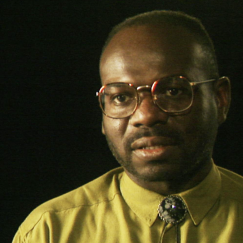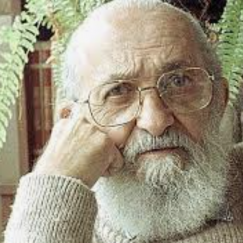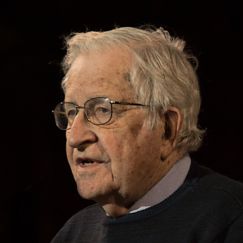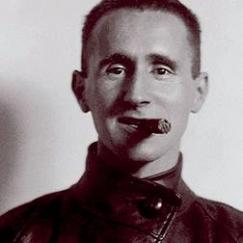If students are not trained to ask basic questions about the images which confront them, if they are not asked to examine the knowledge and assumptions which they already possess, they are being denied the opportunity to develop the most simple and essential critical tools.
Bio/Short Description
One of the progenitors of arts and instruction, Bertolt Brecht (1898–1956) was a theater and media practitioner and theorist who envisioned new forms of art for the twentieth century. He did this first by re-imagining the role of the spectator. As a playwright and director, he intentionally created politically motivated theater, in which his audiences were responsible for critically engaging with the ideas presented in his work. He altered the centuries-old positioning of the audience member, from passive spectator to active participant.
Specifically, Brecht invited his audiences to be informed participants who intentionally considered social bias, cultural prejudice, and other pervasive forms of manipulation. He believed that it was not enough to solely reflect on new ideas within the theater space; he invited his audience and performers to act on the ideas they had generated in practical settings outside of the theater.
Brecht’s theories demanded a re-functioning of the traditional theatrical space, from a place of entertainment into an educational space, in order to meet the needs of the ideal spectator that he imagined. This new space, the “Epic Theatre,” as he described it, “appeal[ed] less to the feelings than the spectator’s reason” and required that “instead of sharing an experience the spectator must come to grips with things [in the world]” (Brecht 1968a, 23).
The restructuring of the theater space also required new theater techniques. To do this, Brecht rejected the melodramatic spectacle of the popular theater and instead produced a theatrical space composed of fragmented scenes, pictures, text, and music—each contrasting, contradicting, and interrupting the traditional theatrical trajectory in order to remind spectators that they were no longer participating in artifice. Brecht held that the theater should “arouse [the viewers’] capacity to action” (1968b, 37).
Brecht’s reimagining of theater audiences, spaces, and techniques demanded new and timely literacies. While he never directly addressed the concepts of media literacy as we understand them, Brecht’s practical work and writings were precursors to critical literacy and subsequent media literacy projects that developed later in the twentieth century.
HOW THEY INFLUENCED YOU?
External Links
Other Grandparents
 Marlon Posted By: Renee HobbsOn:11/29/2023 - 00:56
Marlon Posted By: Renee HobbsOn:11/29/2023 - 00:56
 danahPosted By: Yonty FriesemOn:01/06/2023 - 07:34
danahPosted By: Yonty FriesemOn:01/06/2023 - 07:34
 PaoloPosted By: Renee HobbsOn:07/22/2021 - 16:11
PaoloPosted By: Renee HobbsOn:07/22/2021 - 16:11
 NoamPosted By: Renee HobbsOn:05/23/2020 - 03:48
NoamPosted By: Renee HobbsOn:05/23/2020 - 03:48
 Jon Posted By: Renee HobbsOn:05/10/2020 - 00:12
Jon Posted By: Renee HobbsOn:05/10/2020 - 00:12



Amy Petersen Jensen
I first encountered Brecht’s ideas as an undergraduate theater major at Brigham Young University in Utah. It was 1987, and I was a nineteen-year-old Mormon girl whose primary exposure to the theater had been the religious pageants and roadshows put on by my church. My limited experiences with professional theater production were the highly polished interpretations of Shakespeare performed at a regional equity house, the Utah Shakespeare Festival. Of course, I was also immersed in the 1980s films of John Hughes and others, and I had had some experience with art-house movies, but I had certainly not formulated a personal aesthetic.
When I imagined the purposes of theater, film, or any of the arts, I was most compelled by the notion of story. I welcomed the poetic artifice and theatrical means that connected me, as an audience member, to the narrative of a play or film. I had not yet considered the importance of viewing a work of art as a material production that potentially represented the multiple contexts in which it was created. In a directing class, I was assigned to read selections from Brecht’s “A Short Organum for the Theatre.” Brecht had written this work late in his life with the intent of drawing a “description of theatre in the scientific age” (Brecht 1968c, 205). The ideas therein were based on his practical work in the theater. In my reading, I fixed on a sentence in which Brecht writes, “The theatre as we know it shows the structure of society (represented on the stage) as incapable of being influenced by society (in the auditorium)” (189). Contemplating his words, I became aware, for the first time, of the potential dialectic between spectators and the art they observed.
I had always loved being entertained by art. In fact, Brecht describes what had been my desired interactions with theater and film at the beginning of “Short Organum”: “[Popular theater] consists of this: in making live representations of reported or invented happenings between live human beings and doing so with a view to entertainment” (Brecht 1968c, 180). I took great pleasure in consuming good art—and to be perfectly honest, even very bad art—for pleasure only. Because of this, I was a devoted consumer of art objects, but I was not a participatory spectator.
What Brecht describes is a different theory of the theater, one where artifice is replaced with educational structures. In his essay “Theatre for Pleasure or Theatre for Instruction,” he describes an “instructive theatre” in which “oil, inflation, war, social struggles, the family, religion, wheat, the meat market, all became subjects for theatrical representation. . . . As the ‘background’ came to the front of the stage so people’s activity was subject to criticism . . . [t]he theater became an affair for philosophers, but only for such philosophers as wished not just to explain the world but also to change it” (Brecht 1968d, 71–72).
Brecht’s notions of the active and influential audience in “A Short Organum” and in “Theatre for Pleasure or Theatre for Instruction” compelled me to consider my responsibility to form a different, more active engagement with art and the world at large. I didn’t fully realize this at the time, but my engagement with Brecht’s theories had set me on a course of study in which I would vigorously begin to consider the social, cultural, and political implications of audience engagement with a work of art.